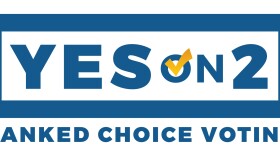Earlier this month, we examined the arguments for and against a ranked choice voting system — Question Two on the Massachusetts ballot. Now, we’re focusing on Question One, the “’Right to Repair Law’ Vehicle Data Access Requirement Initiative.” Tommy Hickey is the director of the Right To Repair coalition, a group of 4,000 independent and local auto parts and repair shops – as well as consumers and drivers – who support Question One. He spoke with WAMC to make his case.
HICKEY: In 2012, I hope voters remember we voted in favor of the Right To Repair ballot in a record-setting 86%. But there was a carve out in the law, there was a carve out of any wireless communications, a system called telematics. And right now, this year in 2020, 90% of cars, new cars, have this telematics system. So this ballot initiative closes the loophole, and it gives owners direct access to their wireless diagnostic and repair information. Right now, the car manufacturer, who has a monetary interest in controlling that information, is the only entity who has that information. And we're saying in this ballot, that's not right, the owner bought the car. Let's give that information directly to the owner of the car.
WAMC: Can you explain how exactly data about cars plays into Question One?
So if this ballot were to pass, the car manufacturers will have to create an open and standardized platform capable of securely giving the owner direct access to their wireless diagnostic repair information through a mobile based application. So it would be accessible by the owner, and the owner could authorize an independent repair shop or a dealership of their choice so that they can make the repair.
The opposition to this question frame their opposition as one of data security. What do you speak to those concerns around this question?
I think the car manufacturers have resorted to scare tactics. First of all, I want to mention that they say this is about GTS information, direct access by third party personal information. That's just not true. If you look at the actual language of the ballot, you'll see this is about mechanical information, and the Attorney General has also summarized this, necessary to diagnose, maintain and repair the car. A number of cybersecurity experts have talked about this can be done in a safe and secure manner. Ed Davis, former Boston Police Commissioner, at Security Ledger has written about this. (Editor's note: Ed Davis is a paid consultant for the campaign.) Bruce Schneier teaches cybersecurity at MIT. And remember, car manufacturers are already doing this. They're already sharing this with their dealerships. So we know this can be done in a safe and secure way. And right now they're using scare tactics because they have a monopoly on this repair information. And they're circumventing the 2013 law because this was carved out of it.
A large number of independent repair shops and auto stores have backed the Yes On One movement. What do they stand to gain from this passing?
What we voted for in 2012. We're a coalition of 1,600 independent repair shops and 40,000 jobs here in the aftermarket. Without the aftermarket, we all know what happens with the market: Prices go up, convenience goes down. And pretty soon you’ll only be able to get your car fixed at a dealership. This is about updating a law that was already voted on. Technology, advancements in technology, should not take away that choice. Without a competitive, without up to date technology in a competitive field, that consumers lose and 40,000 jobs here in Massachusetts.
Can you unpack that? Why are all those jobs at stake?
Because there's a new technology. There's a more efficient and more competitive way. It'd be like saying you can't use your cell phone, you have to use a landline when a cell phone comes out. The independent repair and the car owner has to be able to evolve as the car evolves. And in a competitive field if you don't have the best technology, if you don't have up to date information you lose. Without the law to mandate car manufacturers giving this to independent repair shops, giving this to owners, they won't do it. They'll share with their dealerships because the end of the day dealerships maximize their bottom line and maximize their profit.
So at the end of the day, what's the takeaway for consumers if Question One passes?
I think it's important for voters to know that voting “No” is not going to stop the technology. Voting “No” means car manufacturers will be the only entity that can collect this information and share it with their dealerships, meaning you will lose you will start to lose your repair choice when you get into these model year 2020, 21, 22, and beyond. Voting “Yes” on this empowers you as a consumer to get direct access to that wireless diagnostic repair information, make you the gatekeeper of your own information. We believe as a coalition if you bought the car, you should have the information necessary to fix it. And again, “No” means the car manufacturers still collect it. “Yes” means you as the car owner get direct access and choose where that information goes.






